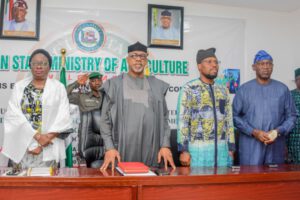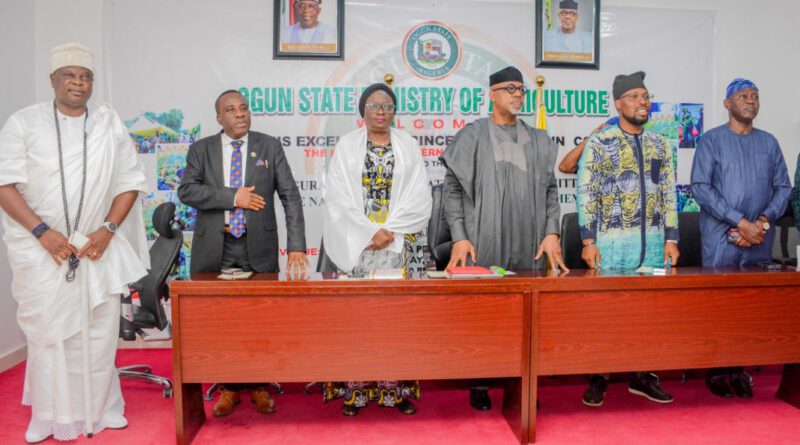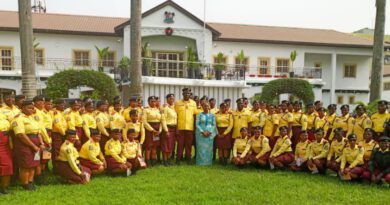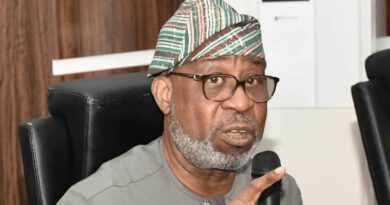Ogun to Encourage Wet and Dry Season Farming as Abiodun Inaugurates Committee on National Agricultural Growth Scheme
Ogun State Governor, Prince Dapo Abiodun said the state is working towards producing enough food for local consumption and for export through wet and dry season farming.

The governor stated that his administration is committed to developing all sectors of the state’s economy, particularly agriculture, due to its potential in revenue and employment generation, as well as food security and poverty alleviation.
Prince Abiodun spoke during the inauguration of a 13-member State Working Committee (SWC) of the National Agricultural Growth Scheme – AGRO POCKET, which took place at the Governor’s Office, Oke-Mosan, Abeokuta.
He said: “Our target is to produce enough food to attain self-sufficiency in a short time and, in the long term, to produce enough food for other states and for export.
“As an administration, we are committed to the development of all sectors of our state economy. In particular, we recognize the immense potential of the agricultural sector, especially in employment generation, revenue generation, food security, and poverty alleviation.
“As a government, we are aware of our responsibility to provide the needed relief to our people, especially during these challenging times.
“The federal government, alongside state governments, has respectively developed a framework and reforms for providing mutually reinforcing components, such as agricultural reforms, improved delivery of farm inputs, and quality extension services.”
Ogun State, he said, has identified viable sources of finance through partnerships with the federal government and the African Development Bank (AfDB), under the Policy-Based Operation (PBO), to boost agricultural production in both wet and dry seasons.
“You will recall that in the year 2023, a pilot scheme in 15 states of the federation was initiated, which was cultivated during the dry season. This led to an astronomical increase in wheat yield. The results revealed that an estimated 277,000 hectares of wheat were planted in Nigeria in 2023-2024, representing a 139 per cent increase over the previous year’s season.
“Undoubtedly, this result is the direct impact of the inputs received under the National Agricultural Growth Scheme supported by the African Development Bank,” he stated.
Abiodun said the state will be supported in the cassava, maize, and rice value chains with an overall number of 2,400 smallholder farmers on 1,200 hectares of land, where the farmers will pay 25 percent of the cost of inputs while the federal government will pay the remaining 75 percent during the wet season of 2024.
He charged the committee members to be mindful that they have been entrusted with the sacred mandate to ensure the efficient running of the program, just as he enjoined them to carry out their assignments with integrity and forthrightness.
“This committee will also be replicated at the local government area levels, including representatives of different stakeholders reflecting the peculiarities of the local government areas,” the governor added.
He noted that the administration’s policy on agriculture has attracted investors to the state, saying that the establishment of the Soilless Farm Laboratory at Awowo in Ewekoro Local Government Area is an example of agripreneurs setting up their businesses in the state.
The governor, while appreciating President Bola Tinubu and the Minister of Agriculture and Food Security, Sen. Abubakar Kyari, for the laudable initiative, emphasized that it would help in addressing the food challenge in the country.
Responding on behalf of the members, the Olota of Ota, Oba Abdulkabir Obalanlege, applauded the federal government for the initiative, saying it was capable of bringing down inflation and increasing food production in the country.
The monarch thanked the governor for driving the process and for what he has done in the agricultural sector, especially in collaborating with foreign partners to reposition the Odeda Farm Settlement, pledging to work towards the success of the program in the state.
The committee is chaired by the governor. The Commissioner for Agriculture, Hon. Bolu Owotomo is the Vice Chairman, while the State Coordinator of FMAFS will serve as the Secretary.




